Israel-Hamas War: What happened on day 110?
IDF launches western Khan Yunis push • 21 soldiers killed in one incident as Israeli suffers highest casualties in one day since October 7
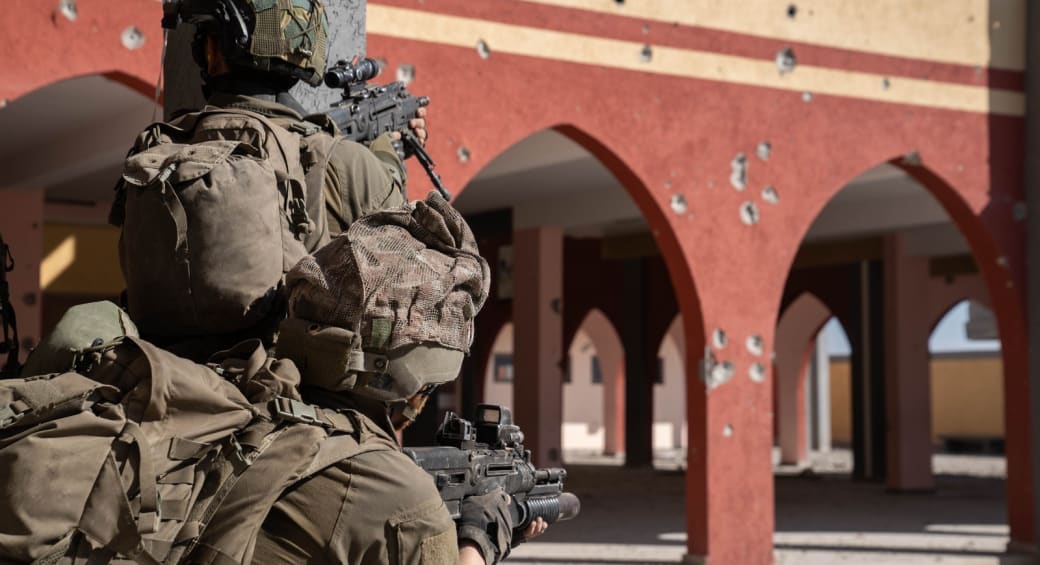
Israel can’t have a veto right on Palestinian self-determination – Borrell
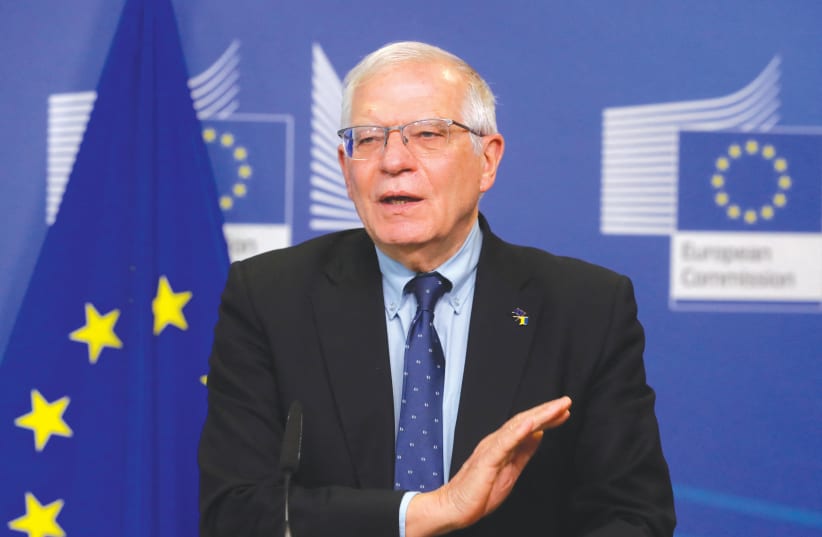
Israel doesn’t have the right to “veto” Palestinian statehood, European Union foreign policy chief Josep Borrell said on Wednesday amid a fierce debate between Prime Minister Benjamin Netanyahu and the international community over what happens once the Gaza war is over.
“Israel cannot have the veto right to the self-determination of the Palestinian people,” Borrell told reporters during a press conference in Brussels on Tuesday.
“They do not have a veto right. If the United Nations recognizes – as it has recognized many times – the self-determination right of the Palestinian people, nobody can veto it,” he declared.
Netanyahu, who is seeking to shore up political support, which has been flagging, on the right. He has been blunt in recent weeks about his opposition to Palestinian statehood, even as the United States, the EU, and moderate Arab countries have insisted that a two-state process must occur once the war is over.
The prime minister has stressed that such a move would be an existential threat to Israel, given the importance of IDF security in both Gaza and the West Bank. This is territory that the international community says must be part of the final boundaries of a Palestinian state.
On Tuesday, Borrell provided the EU’s 27 foreign ministers with the draft of a peace plan that he wants the bloc to adopt and use as a road map to implement the two-state solution based on the pre-1967 lines, with eastern Jerusalem as the Palestinian capital, starting with an international peace process.
Go to the full article >>Why does Hamas's spokesperson have asymmetrical eyes? IDF investigates
In a recent video featuring Abu Obaida, the spokesperson for Hamas, his eyes appear asymmetrical. The IDF explains why.
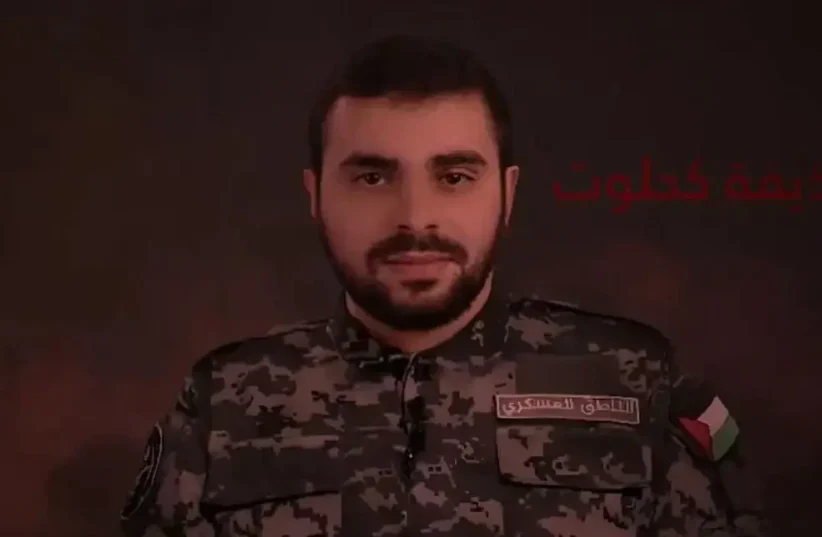
In a recent video shared by Hamas, the terrorist group's spokesperson, Abu Obaida, appears to have asymmetrical eyes.
Questions have arisen within the IDF regarding the cause of this abnormality, as it remains unclear whether he was wounded during an airstrike. Furthermore, the spokesperson's reduced activity has drawn attention.
Abu Obaida recently shared a video denouncing Israel. The IDF noted a distinct difference in the size of Abu Obaida's eyes, even though he attempted to conceal it by wearing a hoodie.
A military source elaborated, stating, "Anyone who closely follows him could see the change that occurred in his eye. It is larger than the other, and this isn't normal."
It is speculated that he may have been injured, and is suffering from inflammation without proper treatment as a result of IDF attacks. His recent decrease in activity has further piqued the IDF's curiosity.
Go to the full article >>IDF pushes in Khan Yunis's west, the heart of Hamas’s operations in Gaza
Dozens more Hamas terrorists had been killed by Tuesday morning.
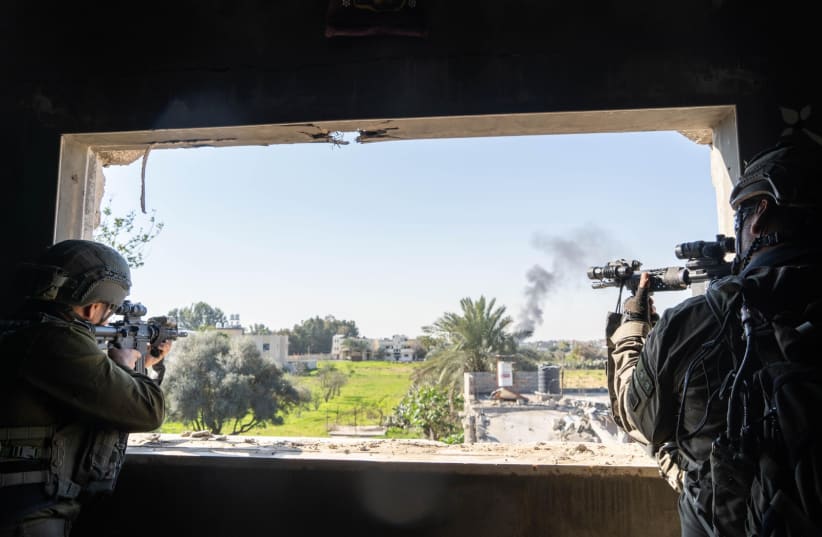
The IDF on Tuesday continued its new, major division-level push in western Khan Yunis, which it had started on Monday, maintaining the most intense fighting since early December, when the military first entered other parts of Hamas’s southern capital.
Combined between Monday and Tuesday, over 100 Hamas terrorists have already been killed in larger-than-usual organized battles, with around 50 Hamas fighters killed on Monday and a similar number on Tuesday.
There were no signs that the incident in central Gaza on Monday, in which 21 IDF soldiers were killed, was having any direct impact on the ongoing Khan Yunis attack.
On Monday, Division 98 unleashed serious forces from its seven brigades, artillery, tanks, and air support and surrounded western Khan Yunis, which, until now, the IDF had mostly steered clear of.
On Tuesday, the IDF said it had killed several ambush units with rocket-propelled grenade launchers and anti-tank missiles, as well as several Hamas forces in extremely close-range fighting.
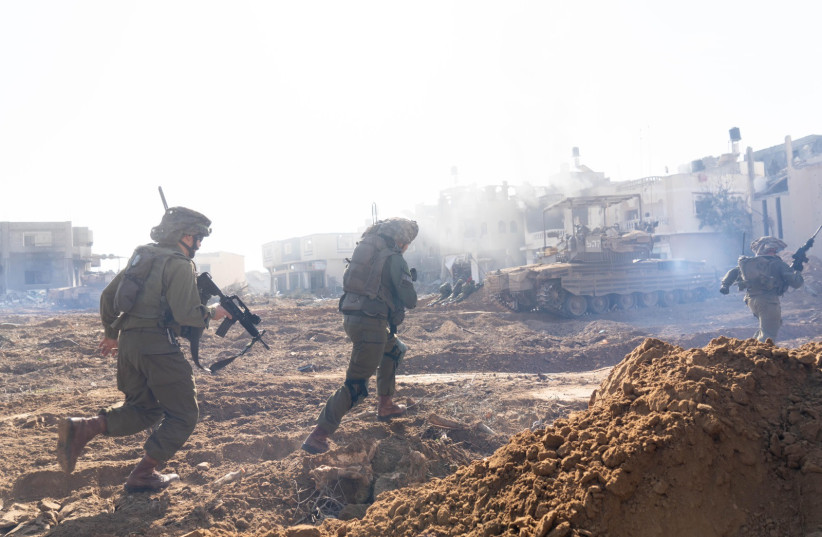
Also on Tuesday, the IDF found the largest strategic tunnel yet discovered in southern Gaza, with a length of one and a half kilometers. The military’s takeover of the tunnel and the manufacturing facilities relating to the tunnel network is expected to significantly harm any future potential Hamas rocket attacks from southern Gaza.
IDF expanding military operations
The IDF’s message early Monday morning about large amounts of airstrikes was in preparation to give the ground forces an easier time moving into the new areas. For the last seven weeks, IDF attacks on Khan Yunis had focused on the northern and eastern portions of the city.
On both days, the IDF called western Khan Yunis the heart of Hamas’s operations in Gaza, including areas where its top two leaders, Yahya Sinwar and Muhammad Deif, grew up.
Go to the full article >>How will Israel's heavy losses in Gaza impact the IDF's war strategy? - analysis
Along with the incidents a couple of weeks ago, plus potential future incidents, the 21 dead soldiers event is likely to embolden those seeking a hostage deal to push harder in the near future.
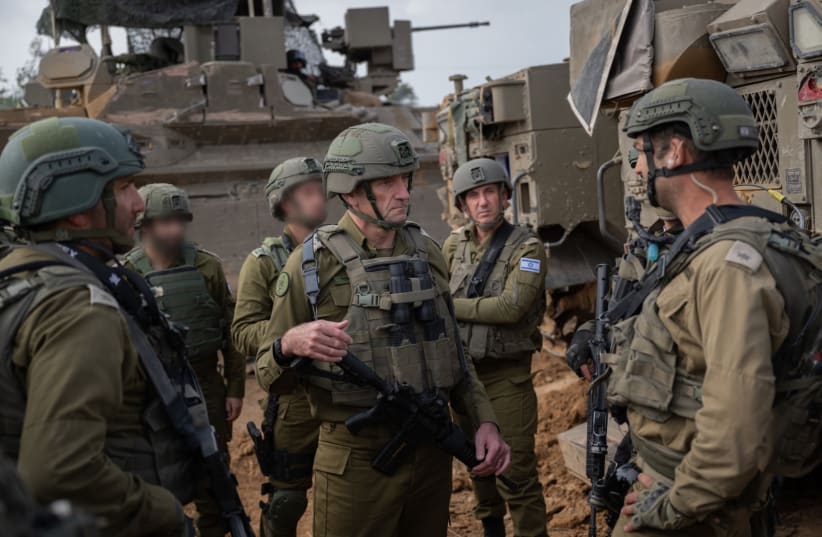
Israel was already at a crossroads about what to do about Gaza.
Should it push to cut a deal to return the remaining approximately 130 hostages that remain there as soon as possible – even at the high cost of not disabling Hamas – or should it hold out, even at the cost of additional risk to the hostages, while still trying to seek another partial hostage return for a temporary ceasefire deal?
The deaths of 21 soldiers, all in one attack and only a couple of weeks after another single incident in which a large number of soldiers were killed, has brought even heavier scrutiny to this dilemma. It temporarily gives those wanting a deal that returns the hostages and ends the war, even if Hamas is not dismantled, the upper hand in the debate.
Even before this incident, senior National Unity Party leaders and war cabinet members Benny Gantz and Gadi Eisenkot, Opposition head Yair Lapid, and a growing movement of hostage families have been pushing harder than ever for a deal to return all of the hostages, even if it falls short of completely dismantling Hamas.
Those in favor of this view cite a moral obligation to return Israeli civilians who were kidnapped from the South – an area not even in legal dispute, like the West Bank – regardless of the broader risk to the nation in the future. They say that the country and the IDF “failed” these civilians and must restore them to safety before any other national interest is considered.
Another argument from officials on this side of the debate is the growing number of IDF losses, as it is unclear whether Israel will achieve anything new by continuing to fight.
Top defense officials have made it clear that, to date, they were ordered by the political echelon never to fire on areas where they knew there were Israeli hostages, even if that meant letting Hamas terrorists temporarily flee.
Go to the full article >>Hamas heads 'open' to release remaining Gaza hostages in deal with IDF - report
Hamas's willingness to discuss a release deal indicates a change in its policy, having stressed previously that it would only release the remaining hostages in exchange for a permanent ceasefire.
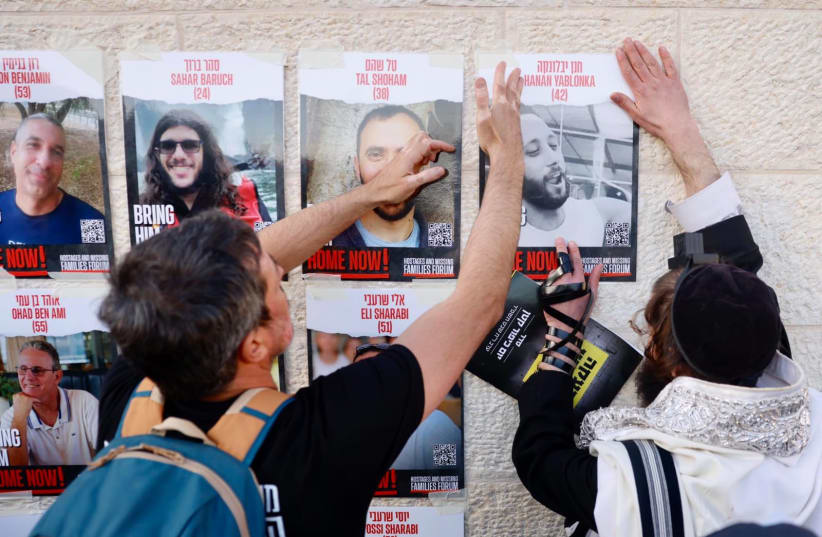
Hamas is open to a Gaza ceasefire deal that would include the release of some of the remaining 130 hostages, the Wall Street Journal reported late on Tuesday, citing Egyptian sources.
As per officials in Cairo, the terrorist group also "expressed openness" to a deal to release all remaining women and children, not including female soldiers taken into Gaza. In the previous hostage release deal that also focused on women and children, 105 hostages were freed from the Strip.
A change in Hamas policy, 110 days into Gaza war?
Hamas's willingness to discuss a release deal indicates a change in its policy, having stressed previously that it would only release the remaining hostages in exchange for a permanent ceasefire in Gaza and the withdrawal of IDF troops.
Earlier on Tuesday, Israeli officials said that the Qatari and Egyptian mediators have not notified them of Hamas's rejection of the two-month ceasefire deal proposed by the Israeli government.
According to the Wall Street Journal, Israeli sources remain skeptical over the realization of said discussions, "but are willing to continue discussing the guidelines for a potential deal."
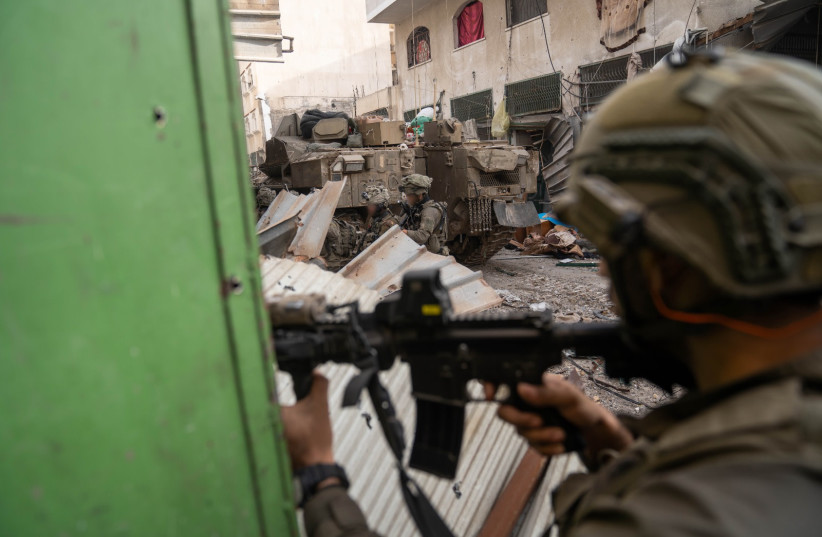
Israel, Hamas have 'broad agreement' on month-long truce - Reuters
Reuters reported early on Wednesday that Israel and Hamas "broadly agree in principle" that an exchange of Israeli hostages for Palestinian prisoners could take place during a month-long ceasefire, but the framework plan is being held up by the two sides' differences over how to bring a permanent end to the Gaza war.
Intense mediation efforts led by Qatar, Washington, and Egypt in recent weeks have focused on a phased approach to release different categories of Israeli hostages - starting with civilians and ending with soldiers - in return for a break in hostilities, the release of Palestinian prisoners and more aid to Gaza.
Go to the full article >>A just war, with an overwhelming cost - editorial
Monday’s tragedy represents a valley – a deep valley. But there have been many peaks as well – first and foremost, the steady, methodical dismantling of Hamas’s infrastructure.
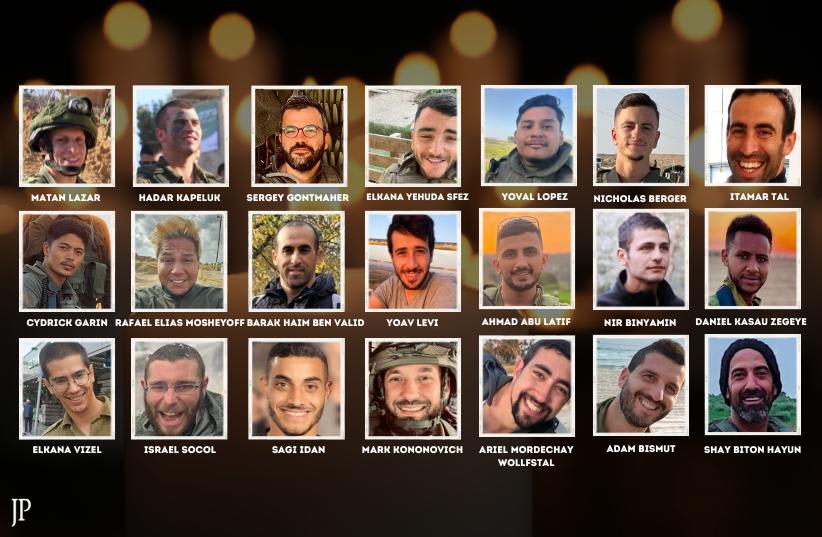
The sadness is overwhelming.
In two horrific explosions in the central Gaza Strip on Monday, just meters away from Israel’s border, 21 lives were extinguished. Twenty-one fathers, sons, husbands, and brothers were killed in an instant. Twenty-one dreams were snuffed out. Twenty-one families were left devastated.
In addition to the 21 reservists who fell in this soul-crushing incident near Kissufim, another three soldiers were killed by an attack in a separate incident in Gaza, rendering Monday Israel’s deadliest day since the current war began with Hamas’ orgy of murder, rape, kidnapping, and mayhem on October 7.
One might have expected that a tragedy of this magnitude, a disaster of this scope, would have led to a chorus of voices inside Israel saying, “Enough is enough; it is time to end the war and bring the soldiers home.”
But that chorus did not emerge, at least not significantly, and that is telling. To the contrary, the dominant message heard Monday was the need to continue forward, despite the mind-numbing loss.
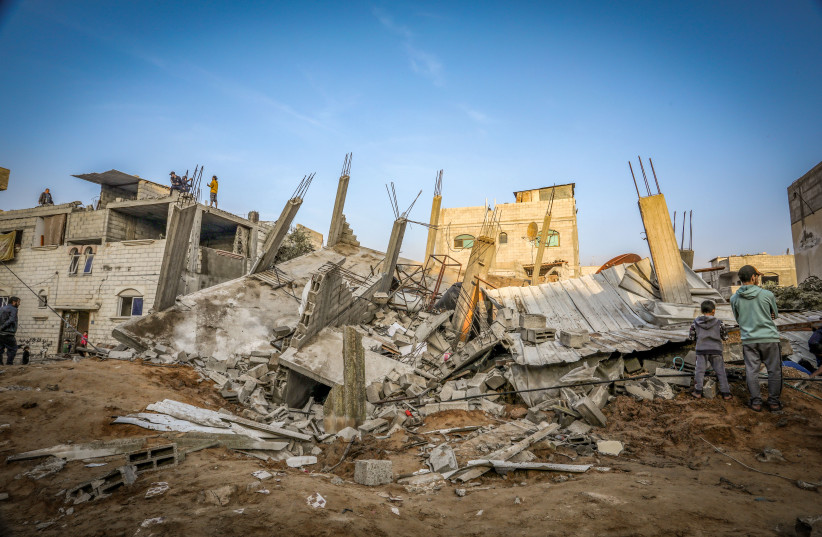
This spirit was summed up in a poignant letter that one of the fallen soldiers, Elkana Vizel, a 35-year-old father of four from Bnei Dekalim, left behind to be opened after his death. “Our overwhelming victory is more important than anything, so please just continue to work with all your might so that our victory is as overwhelming as possible,” he wrote.
Victory is more important than anything else
That message – keep fighting, despite the cost – is one heard often at the funerals of fallen soldiers as well as in conversations with soldiers and reservists who have fought in in Gaza. The message is simple: “Yes, this is difficult; yes, this is painful, but continue fighting until Hamas is defeated, until the hostages are released, and until Israelis can return to their homes.”
Tuesday’s reactions to Monday’s disaster showed that almost 16 weeks into a war that Israel neither expected, wanted, nor triggered, the country has not lost sight of what it is all about.
While in various parts of the world, even well-intentioned people may have lost the thread, that has not happened here.
And what is that thread? Simply put, Israel is fighting because its people were murdered, mutilated, and raped; Israel is fighting to get back those hostages taken by a maniacal terrorist regime; Israel is fighting to ensure that Hamas can never do this again; and Israel is fighting to send a message to others who may seek to emulate Hamas that it would not be in their interests to do so.
This war with Hamas is a just war of no choice, among the most just this nation has ever fought. This explains the widespread support to continue it, despite the exorbitantly high price and the pain and sorrow felt by millions of Israelis on Tuesday.
Israel, over the years, has been lauded for its resilience, and justifiably so. And what is resilience if not the ability to absorb blows and not let them throw you off course?
Strength is the capacity to deliver blows, with Israel demonstrating its strength daily in Gaza as well as on its other fronts, while resilience is the capacity to absorb them. Although Monday’s tragedy saddens Israelis deeply, it must not demoralize the country or shake its belief in this just war; it must not dent Israel’s resilience.
At the outset of this war, Israel’s leaders, both political and military, said that it would be a prolonged campaign, that it would take patience, and that there would be peaks and valleys.
Monday’s tragedy represents a valley – a deep valley. But there have been many peaks as well – first and foremost, the steady, methodical dismantling of Hamas’s infrastructure – and surely there will be more such achievements ahead.
What is important now is to find the cause of Monday’s disaster, implement the lessons learned, and mourn the losses while not allowing the pain to prevent Israel from pursuing a goal that is necessary if it hopes to survive and thrive in this region: thoroughly dismantling Hamas’s capabilities in a manner clear to friend and foe alike.
Those who tragically fell on Monday died in pursuit of that just aim.
Go to the full article >>Israel wants Sinwar, Deif expelled in new ceasefire deal - report
While Israel has sought to negotiate one stage at a time, Hamas is seeking "a package deal" that agrees a permanent ceasefire before hostages are released.

Israel and Hamas broadly agree in principle that an exchange of Israeli hostages for Palestinian prisoners could take place during a month-long ceasefire, but the framework plan is being held up by the two sides' differences over how to bring a permanent end to the Gaza war, three sources said.
Intense mediation efforts led by Qatar, Washington and Egypt in recent weeks have focused on a phased approach to release different categories of Israeli hostages - starting with civilians and ending with soldiers - in return for a break in hostilities, the release of Palestinian prisoners and more aid to Gaza.
The latest round of shuttle diplomacy started on Dec. 28 and has narrowed disagreements about the length of an initial ceasefire to around 30 days, after Hamas had first proposed a pause of several months, said one of the sources, an official briefed on the negotiations.
However, Hamas has since refused to move forward with the plans until the future conditions of a permanent ceasefire are agreed, according to six sources. Most of the sources consulted for this story requested anonymity in order to speak freely about sensitive matters.
While Israel has sought to negotiate one stage at a time, Hamas is seeking "a package deal" that agrees a permanent ceasefire before hostages are released during the initial phase, said one of the sources, a Palestinian official close to the mediation efforts. Israel and Hamas are speaking through the mediators, not talking directly.
A White House spokesman said on Tuesday US Middle East envoy Brett McGurk was in the region - for the second time in a week - for discussions about releasing hostages and that Washington would support a longer "humanitarian pause."
The US State Department and White House, Qatar's foreign ministry and Egypt's State Information Service did not immediately respond to requests for comment.
Two Egyptian security sources said that there was work underway to convince Hamas to accept a one-month truce to be followed by a permanent ceasefire. However, Hamas is requesting guarantees that the second phase of the deal would be carried out, in order to agree to the initial truce, the sources said.
The sources did not provide details of what such guarantees might consist of.
Asked about the negotiations, senior Hamas official Sami Abu Zuhri told Reuters on Monday the organization was open to discussing ideas but that no deal was yet in place.
"We are open to all initiatives and proposals, but any agreement must be based on ending the aggression and the occupation's complete pullout from Gaza Strip," said Abu Zuhri.
One offer by Israel is to end the war if Hamas removes six senior leaders from Gaza, said a seventh source, a senior Hamas official. However, Hamas "absolutely" rejected the proposal, he said.
The source said the list included the masterminds of Hamas' Oct. 7 attacks on Israel, Yahya Sinwar and Mohamed al-Deif, who are Israel's top targets to kill or capture in the war and are thought to be hiding deep within Hamas' extensive network of tunnels beneath Gaza.
Reuters was not immediately able to confirm this proposal with Israeli sources. Israeli Prime Minister Benjamin Netanyahu's office declined a request for comment about the proposal or the broader negotiations. According to recordings leaked to Israel's N12 news network, Netanyahu said such a "surrender and exile" scenario was being discussed in early January.
Netanyahu under pressure
Almost four months after the Hamas attack on southern Israel that killed around 1,200 people, Israel's offensive in Gaza has yet to eliminate Hamas' senior leadership or its capacity to fight.
Netanyahu reiterated this week that only "total victory" over Hamas would bring an end to the war, but he is under increasing pressure to reach a deal, including from members of his war cabinet and the families of around 130 hostages who remain in captivity since the Hamas incursion.
Israel's military on Monday suffered the highest daily death toll of its Gaza offensive with 24 fatalities, including 21 in a rocket-propelled grenade (RPG) attack in central Gaza and three elsewhere.
Five of the sources said Israel had refused to discuss any end to the war that did not include Hamas being dismantled. They did not specify if exiling the leadership would meet that bar.
Israeli government spokesperson Eylon Levy said at a press conference on Tuesday that efforts were ongoing to secure the hostages' release. He said Israel would not agree to a ceasefire deal that leaves Hamas in power in the enclave.
Qatar and Washington were instrumental in negotiating a week-long truce in November that led to the release of more than 100 hostages and around 240 Palestinian prisoners.
Starting on Dec. 28, Qatar's negotiators sent the framework of a new agreement to Hamas and Israel, asking both sides to indicate what they were prepared to agree to, the official briefed on the negotiations said.
When the two sides responded earlier this month, Hamas sought a truce that would last several months, while Israel wanted all the hostages freed in weeks, the official said.
Over the past few weeks, US and Qatari mediators have drawn the two sides closer to agreeing the 30-day process, which would include the release of all hostages, entry of more aid to Gaza and the release of Palestinian prisoners, the official said.
Despite the difficulty of bridging the gap in positions, one of the sources, briefed on the discussions, described the talks as intensive and said a deal could be agreed "at any minute."
US diplomatic efforts
Washington is ratcheting up diplomatic pressure to end the violence. Earlier in January, US Secretary of State Antony Blinken shuttled between Arab states and Israel on a frenetic tour aimed at finding a way forward from the bloodshed.
However, Hamas is seeking guarantees that Israel will not restart the conflict, a US source briefed on the matter and the Palestinian official said.
Hamas wants the United States, Egypt and Qatar to guarantee the implementation, and is concerned that Netanyahu's government would resume fighting once Hamas frees civilian hostages, even if Israeli soldiers remain captive, the Palestinian official said.
During this round, Hamas had sought the release of all Palestinian prisoners from Israel's prisons, including those that participated in the Oct. 7 attacks, the US source said. The official briefed on the talks said Hamas had since softened that demand, which would likely be vehemently opposed by Israel.
Hamas believes that before seriously talking about a long-term ceasefire, Israel wants to conclude its operations in Khan Younis, the southern city in Gaza that has seen the most intense offensive and fighting in recent weeks, the Palestinian official said.
Reuters could not immediately establish the status of discussions about whether Israel's troops and armor would remain in Gaza during any prolonged ceasefire.
Go to the full article >>Does Iran really believe Israel wants regional war?
Iran has publicly accused Israel of seeking an "all-out war" in the Middle East. But how does the Iranian regime truly feel?
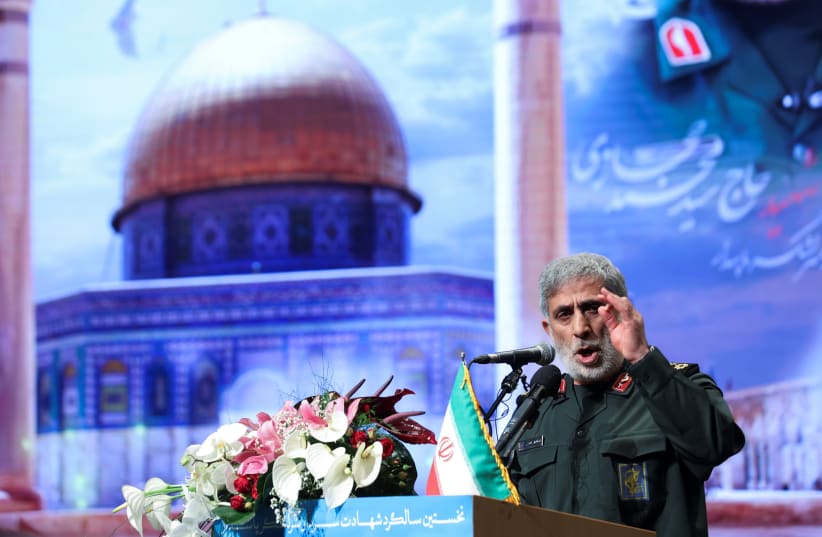
Iranian pro-government media can generally be relied upon to present the Iranian regime’s narrative and also predict what Iran’s next moves may be. This means that paying close attention to the way the regime presents messaging is important to understand Tehran’s policies in the region.
A recent article at Iran’s Tasnim News examined what it claimed were Israeli airstrikes in Damascus.
The report included several experts who commented on recent developments in Syria. In the article, one expert says that “in this short period, from the terrorist explosions in Iran and the assassination of the martyr Seyed Razi Mousavi in the south of Damascus, the assassination of al-Arouri in the suburbs of Beirut, as well as Haj Sadiq (Omidzadeh)…The Zionists are trying to push the axis of resistance towards an all-out war in the region in every possible way and as a result, opens the feet of America and all western countries, even NATO and England, to a regional war.”
Risks of wider regional conflict
The messaging above examines the chances for a wider regional war. Iran calls its proxies the “axis of resistance” and this describes Iranian-backed militias in Syria, Hezbollah, Hamas, Palestinian Islamic Jihad, as well as the Houthis and militias. One of the pro-Iran militias in Iraq claimed they had tried to target Israel with a drone on January 22. Iran is trying to push all these groups to confront Israel on various fronts and in various arenas. Israel’s leadership has mentioned these escalations.
For instance, Israel’s Defense Minister has discussed the need to deter Hezbollah from further attacks in the north. The question is now whether Iran truly believes that a regional war could happen. Iran is generally cautious in this respect. It wants to present Israel and the US with many challenges and carry out small attacks but is generally not willing to risk any of its proxies being destroyed.
Iran is deeply focused on Syria now and also several members of the IRGC who were killed in Damascus. Iranian media included other articles on this issue on January 23. One claimed that Israel is now acting out of “desperation.” Another article highlighted the 24 IDF soldiers recently killed in Gaza and called this a major setback for Israel. In other reports, the Iranian regime said it had added new strategic “drones” to its arsenal and also the Iranian Supreme Leader threatened Israel.
Iran is not the only Middle Eastern power focused on this issue of a possible wider regional war. An article at Arab News further examined the chances for wider regional escalation. Ghassan Charbel, editor in chief of Asharq al-Awsat, wrote about “Iran on the borders of Israel. He writes “Qassem Soleimani was the architect of the Iranian thread linking Baghdad to Beirut via Damascus, in addition to the Yemeni breakthrough represented by the Houthis’ control. When Yahya Sinwar launched the Al-Aqsa Flood on Oct. 7 and Israel responded with its brutal war in Gaza, the Iranian thread had intensified on the four maps. Whether Iran was aware of the moment of the flood or not, its occurrence would have been impossible without its policies and arsenals that are scattered throughout the region.”
It appears now that various trends are coming together leading to concerns in Iran and elsewhere that escalation could occur. Western media has largely already gotten to the point of predicting regional escalation and has now gone back to focusing on other things.
Meanwhile, Iran’s regime must wonder whether operationalizing proxies in Syria, Iraq, Yemen, and elsewhere is having the desired effect. The US and its allies are now carrying out larger strikes in Yemen. Hezbollah has lost more than 150 of its terrorists. Hamas has lost 9,000 with thousands more wounded. Iran’s proxies in Iraq are still active, but they have less to do these days. They have continued to threaten US forces in Iraq. This leaves many questions for Iran this week as it continues to digest what may come next in Syria and looks at other fronts against Israel.
Iran likely does not truly believe that Israel wants a regional conflict. Instead, it is trying to trumpet this theory, perhaps as a way to climb down from such an eventuality.
Go to the full article >>US military strikes two Houthi anti-ship missiles in Yemen
The US strikes are the latest against the Iran-backed group over its targeting of Red Sea shipping, and followed a larger round of strikes a day earlier.
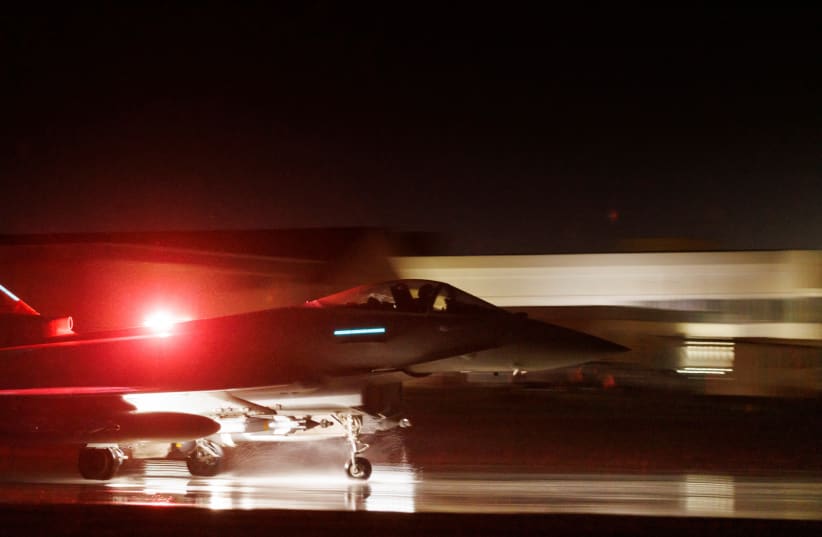
The US military carried out more strikes in Yemen early on Wednesday, destroying two Houthi anti-ship missiles that were aimed at the Red Sea and were preparing to launch, the US military said in a statement.
The US strikes, which took place at roughly 2:30 a.m. (2330 GMT), are the latest against the Iran-backed group over its targeting of Red Sea shipping, and followed a larger round of strikes a day earlier.
The Houthis, who control the most populous parts of Yemen, have said their attacks are in solidarity with Palestinians as Israel strikes Gaza. The attacks have disrupted global shipping and deepened concern that fallout from the Israel-Hamas war could destabilize the Middle East.
Go to the full article >>Nuclear-armed Israel's war in Gaza keeps world on edge of doomsday - Doomsday Clock
The clock in 1947 to warn the public about how close humankind is to destroying the world.

Atomic scientists on Tuesday kept their "Doomsday Clock" set as close to midnight as ever before, citing Russia's actions on nuclear weapons amid its invasion of Ukraine, nuclear-armed Israel's Gaza war and worsening climate change as factors driving the risk of global catastrophe.
The Bulletin of the Atomic Scientists, as they did last year, set the clock at 90 seconds to midnight - the theoretical point of annihilation. Scientists set the clock based on "existential" risks to Earth and its people: nuclear threat, climate change, and disruptive technologies such as artificial intelligence and new biotechnology.
"Conflict hot spots around the world carry the threat of nuclear escalation, climate change is already causing death and destruction, and disruptive technologies like AI and biological research advance faster than their safeguards," Rachel Bronson, the bulletin's president and CEO, told Reuters, adding that keeping unchanged from the prior year is "not an indication that the world is stable."
The Chicago-based nonprofit created the clock in 1947 to warn the public about how close humankind is to destroying the world.
Go to the full article >>Israel-Hamas War: What you need to know
- Hamas launched a massive attack on October 7, with thousands of terrorists infiltrating from the Gaza border and taking some 240 hostages into Gaza
- Over 1,200 Israelis and foreign nationals were murdered, including over 350 in the Re'im music festival and hundreds of Israeli civilians across Gaza border communities
- 132 hostages remain in Gaza, IDF says